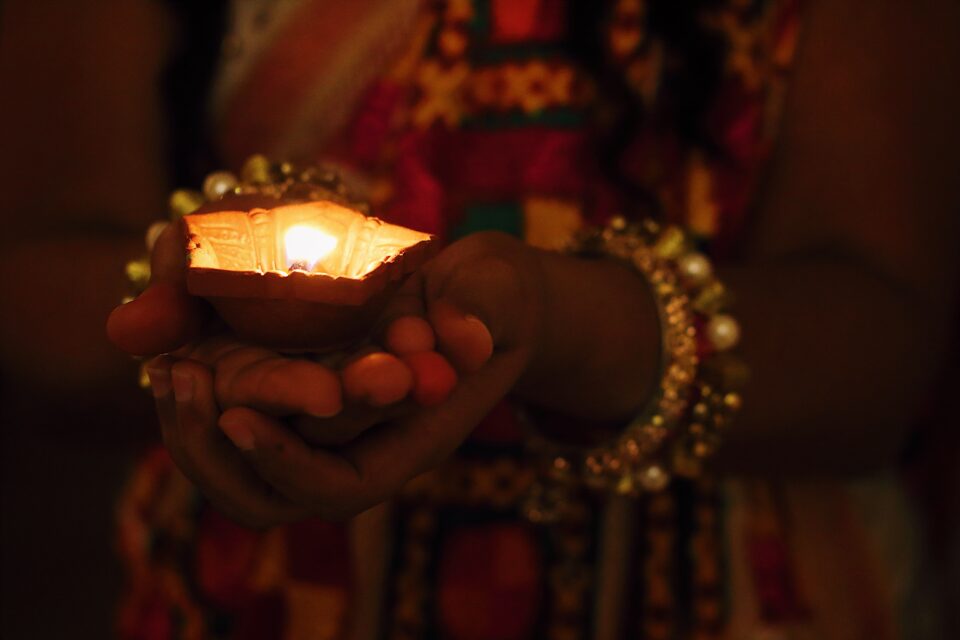For people of Indian descent across that country and the world, Diwali is one of the most widely celebrated festivals. The festival, whose name comes from the Sanskrit word dipavali, meaning “row of lights,” serves as a beacon of brightness every year, celebrating the victory of light over darkness, good over evil and knowledge over ignorance.
Celebrated by people of Hindu, Buddhist, Jain and Sikh beliefs, as well as those of Indian and non-Indian descent, the festival lasts for five days. The dates of the festival are based on the Hindu lunar calendar, which marks each month by the time it takes the moon to orbit Earth. Diwali commences on the darkest night on the Hindu lunar calendar, during the month Kartika, which falls in between mid-October – November in the Gregorian calendar. This festival also marks the last harvest before winter.
History and Origin of Diwali
Historically, Diwali can be traced back to ancient India. It is most likely a festival of lights which began as an important harvest festival that stretches back more than 2,500 years. However, various legends are associated with the origin of Diwali. Many of these stories are about the triumph of good over evil.
- The most popular tale associated with Diwali is the return of Lord Ram to Ayodhya following his 14 years of exile and after defeating the demon king Ravana.
- In some parts of India, especially in Bengal, the festival is dedicated to the worship of Maa Kali, the dark goddess of strength.
- Most of the Hindu people worship Goddess Lakshmi on Diwali, considering her as a goddess of prosperity and wealth.
The meaning of Diwali
Every ritual of the Diwali festival has a significance and a story behind them. Diwali symbolises the spiritual victory of light over darkness, good over evil and knowledge over ignorance. The lights of Diwali signify a time to destroy all our dark desires and thoughts, eradicated dark shadows and evils and gives us the strength and the zeal to carry on with our goodwill for the rest of the year.
Diwali is a celebration that unites people from every nook and corner of the country irrespective of religion and caste. It is a time when people embrace one another with joy and laughter. The festival is celebrated with an air of friendliness and holds an aura of purity.
How Diwali is celebrated
Because it’s celebrated by a diverse range of people with their own faith backgrounds and cultural traditions, many people celebrate the holiday in their own unique ways, but it’s generally a time for family, performing charitable acts and selfless service, deep cleaning and decorating the home, performing religious ceremonies, stringing up lights and reflecting on deeply held values. The festivities can span over five days, each of them holding its own significance:
- Dhanteras: The first day is dedicated to the goddess Lakshmi, and people often mark the occasion by cleaning their houses and making rangolis or kolam, intricate coloured patterns made on the floor with flowers, powder, rice, or sand. They often go shopping and make sweet and savoury Indian treats to share.
- Chhoti Diwali or Kalichaudas: The second day, also known as “small Diwali ”, is often spent preparing for the largest celebration that takes place on the third day. People also offer prayers for the souls of their departed ancestors and many display clay lamps, called diya.
- Diwali: The third and largest day of the five days of Diwali involves dressing in new clothes, visiting a temple to perform a puja, or worship service, lighting diyas and other lights around the house, and enjoying fireworks celebrations. It’s a time for gathering with loved ones, feasting, and playing games of chance, especially card games.
- Annakut, Padwa, Govardhan Puja: The fourth day of Diwali marks the first day of the New Year for many regions of India, a time to feel thankful for the past year, look ahead to the next and exchange small gifts. Some people perform pujas for a prosperous new year. This day can also be dedicated to the bond between husbands and wives, to recognize the love between Rama and Sita.
- Bhai Duj, Bhai Bheej: The fifth and final day of Diwali celebrates the bond between sisters and brothers, so family members will often visit one another on this day and share a meal together.
How to wish someone a happy Diwali
Some Hindus, Sikhs and Jains will send Diwali greeting cards during the festive season and may include a gift of Indian sweets to mark the occasion.
Saying “happy Diwali” is a simple and easy way to let someone know you’re thinking of them, and something you can say to anyone who is celebrating Diwali.
You can also say “Diwali ki Shubhkamnaye” (pronounced: Dee-vaa-lee kee Shub-kaam-nigh) or “Shubh Deepavali” (pronounced: Shub deepaavalee) to wish someone a happy Diwali in Hindi.
In Marathi, happy Diwali is “Shubh Diwali” (pronounced: Shub Dee-vaa-lee). In Punjabi the message is “Tuhanu Diwali diyan bohat both vadhaiyan”, and Tamil it is “Deepavali Nalvazhthukkal”. However, a simple “happy Diwali” is always appreciated.

